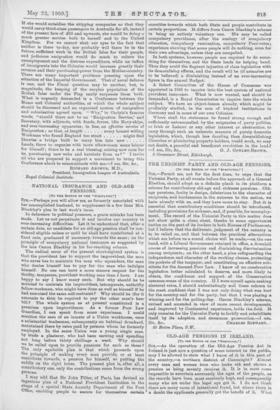NATIONAL INSURANCE AND OLD-AGE PENSIONS.
ITo Tan rcnieon Of Tall "Slie SIR,—Perhaps you will allow me, as formerly associated with her accomplished husband, to supplement in a few lines Mrs. Mickley's plea in last week's issue. In deference to political pressure, a grave mistake has been made. Let us not perpetuate it and involve our country in ever-increasing difficulties. Let it be understood that, after a certain date, no candidate for an old-age pension shall he con- sidered eligible unless or until he shall have contributed at a fixed rate, graduated if necessary, towards the same; on the principle of compulsory national insurance as suggested by the late Canon Blackley in his far-reaching scheme. The radical error of the present short-sighted system is that the provident has to support the improvident, the man who saves has to maintain the man who squanders, the man who denies himself has to pay for the man who indulges himself. No one can have a more sincere respect for the thrifty, temperate, provident working man than I have. I am happy to say I know many such. But why should he be mulcted to maintain his improvident, intemperate, unthrifty fellow-workman, who might have done as well as himself if he had exercised the same self-restraint Why should he (for it amounts to this) be required to pay the other man's beer bill ? The whole system as at present constituted is a Premium upon improvidence. As a former Poor Law Guardian, I can speak from some experience. I could mention the ease of an inmate of a Union workhouse, once a substantial tradesman, subsequently an habitual drunkard, maintained there by rates paid by persons whom he formerly employed. In the same Union was a young single man, by trade a plasterer, who had been earning and spending not long before thirty shillings a week. Why should we be called upon to provide pensions for such as these ? The only equitable plan is that which proceeds upon the principle of making every man provide, or at least contribute towards, a pension for himself, so putting the saddle on the right horse. The present plan is, after all, a contributory one, only the contributions come from the wrong Persons, I may add that Sir John Pilter, of Paris, has devised an Ingenious plan of a National Provident Institution in the shape of a special State Annuity Department of the Post Office, enabling people to secure for themselves certain annuities towards which both State and people contribute in certain proportions. It differs from Canon Blackley's scheme in being an entirely voluntary one. His may be called compulsory providence, after the analogy of compulsory education, compulsory vaccination, compulsory Poor-rates; experience showing that some people will do nothing, even for their own advantage, unless they are compelled. In both systems, however, people are required to do some- thing for themselves, and the State lends its helping hand. Thus they avoid the flagrant injustice of class legislation with its demoralising effects, and the result will be (if actuaries are to be believed) a diminishing instead of an ever-increasing figure in the annual Budget. A Select Committee of the House of Commons was appointed in 1885 to inquire into the best system of national provident insurance. What is now wanted, and should be demanded, is a Royal Commission to inquire into the whole subject. We have an object-lesson already, which might be profitably studied, in the case of kindred institutions in Germany and in some of our own Colonies. W here shall the statesman be found strong enough and sufficiently untrammelled by the exigencies of party politics, or Irish or Labour or any other interest or obstruction, to carry through such an unheroic measure of purely domestic, legislation, which, though less dazzling than disestablishing Churches or plundering property-holders, would work, we may not doubt, a peaceful and beneficent revolution. in the land —I am, Sir, &c., G. J. COWLEY-BROWN. 9 Grosvenor Street, Edinburgh.










































 Previous page
Previous page